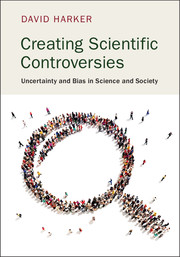Book contents
- Frontmatter
- Dedication
- Contents
- Preface
- Introduction: scientific authority and the created controversy
- Part I Lessons from the Philosophy of Science
- Part II Biases, Arguments and Created Controversies
- 5 Inherent irrationality: cognitive biases and heuristics
- 6 Thinking more clearly: arguments, reasoning and informal fallacies
- 7 Created controversies and how to detect them
- Points to remember: Part II
- Part III Exposing Created Controversies
- Concluding remarks
- References
- Index
7 - Created controversies and how to detect them
from Part II - Biases, Arguments and Created Controversies
Published online by Cambridge University Press: 05 October 2015
- Frontmatter
- Dedication
- Contents
- Preface
- Introduction: scientific authority and the created controversy
- Part I Lessons from the Philosophy of Science
- Part II Biases, Arguments and Created Controversies
- 5 Inherent irrationality: cognitive biases and heuristics
- 6 Thinking more clearly: arguments, reasoning and informal fallacies
- 7 Created controversies and how to detect them
- Points to remember: Part II
- Part III Exposing Created Controversies
- Concluding remarks
- References
- Index
Summary
Scientists often disagree. As we saw in Chapter 4, dissent may be reasonable, appropriate and even desirable. If competing approaches to questions of mutual interest each enjoy some measure of empirical success, then we might hope that they would all receive continued attention, approximately commensurate with their perceived degrees of success and promise. Reasonable scientific disagreement can help clarify the topics under dispute and may function as a stimulus for new research and a conduit for progress. Sciences might not technically require controversy in order to advance, but they are certainly familiar bedfellows.
The details surrounding most scientific debates never reach the public ear. The finer technical points concerning how best to measure, interpret or analyse particular results may be largely incomprehensible to those who lack relevant training. Some apparent scientific controversies, by contrast, receive enormous public attention, whipping up great storms of sound and fury. Journalists lavish the issues with great attention. Popular books are written. Proponents for competing views stage public debates, appear on popular radio and television shows and oversee labyrinthine websites which link to new studies that sound authoritative and important, provide commentary that seems erudite and informed and offer criticisms of alternative scientific conclusions that appear grave and compelling. These appearances of controversy, often surrounding socially important issues, might be regarded as evidence that genuine disagreement exists within the relevant scientific community. As we know, however, sometimes appearances are deceptive.
Deceptive appearances can pave the way to significant problems. If those who are most qualified to evaluate an issue are in broad agreement about the correct conclusions to draw from available evidence, but the public perception is of experts deeply divided, then the talents and labours of our experts are in danger of being lost. Ignoring those who are most qualified to judge an issue can only be detrimental. In the final section of the book, we will look at several examples where many claim that the relevant sciences are being baselessly ignored. In this chapter, we will consider in more detail the very concept of a created, or manufactured, controversy. Among the questions we will address are the following.
- Type
- Chapter
- Information
- Creating Scientific ControversiesUncertainty and Bias in Science and Society, pp. 151 - 169Publisher: Cambridge University PressPrint publication year: 2015



